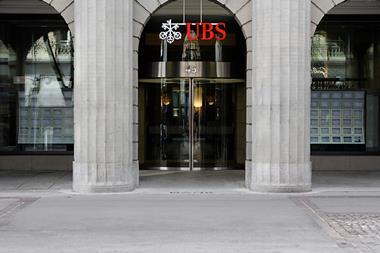Swiss pension funds fear that a lack of competition will emerge in the banking sector due to the takeover of the country’s largest lender UBS of rival Credit Suisse, harming their ability to negotiate with the banks.
The risks of a monopoly, with a single large bank on the Swiss market, may have a negative impact for pension funds as bank clients, according to Ethos Foundation.
“We think that the consolidation of the two Swiss entities will create a very important systemic risk for the Swiss financial center, and will have a negative effect on the efficiency of themarkets, in particular on the possibility for banks’ clients, starting with the pension funds and [small and medium-sized enterprises] SMEs, to benefit from the best possible prices and conditions,” Vincent Kaufmann, chief executive officer of Ethos, told IPE.
With only one big player, Kaufmann added, clients such as pension funds are not able to leverage competition to their advantage to obtain the best prices and conditions.
“Many of our members maintain business relationships with both Credit Suisse and UBS for diversification reasons and find themselves confronted overnight with a concentration in the Swiss banking sector,” Martin Roth, president of the Swiss pension fund association ASIP, told IPE.
ASIP has been closely following recent events and the situation surrounding the takeover of Credit Suisse but, he added, pension funds are ultimately responsible for assessing the consequences of the takeover and taking concrete actions.
Françoise Bruderer, CEO of the pension fund for the Swiss postal services Pensionskasse Post, a Credit Suisse shareholder, told IPE that pension funds should be relieved that a solution has been found to the difficult situation surrounding the bank.
“We will not act rashly, nor have we done so far, and will monitor developments. Markets don’t react only to Credit Suisse,” she added.
Shareholders’ value
In a statement issued this morning, Ethos, which represents the interests of domestic Pensionskassen that are shareholders of both Credit Suisse and UBS, stated that the schemes will not vote as shareholders on the takeover at the next general meeting, as a federal ordinance allows to waive Swiss laws on mergers.
The deal was in fact signed following an emergency process bypassing the shareholders’ vote as the shares of Credit Suisse plunged last week and investors panicked.
The Swiss government had laid the legal basis for the merger through emergency rules allowing the Swiss National Bank (SNB) to grant Credit Suisse additional liquidity through a bankruptcy process, and a default guarantee for liquidity loans.
Ethos is now calling on UBS to consider the strategic option of separating out the Swiss banking division of Credit Suisse from the rest of the UBS group, listing it on the public market as the situation becomes more stable, to preserve jobs and maintain competition.
“There are of course potential synergies in some divisions that could bring value to shareholders, in particular in the international wealth management division,” Kaufman told IPE.
The foundation added that it will consider taking legal action in the coming days to determine the responsibilities for the failures at Credit Suisse, defending the interests of minority shareholders, in the first place of Swiss pension funds.
A swift deal
UBS has agreed to acquire rival Credit Suisse in an all-share deal worth CHF3bn, equal to CHF0.76 per Credit Suisse share, a significant discount to Credit Suisse’s market cap as of Friday last week.
The Swiss government, the financial market supervisory authority FINMA, and SNB have played a key role in the deal, rushing to take swift decisions in a matter of days to save Credit Suisse being hit by outflows of funds exacerbated by the banking crisis in the US following the collapse of the Silicon Valley Bank, giving guarantees to UBS for risks related to the transaction.
The merger has already received approval by FINMA in Switzerland, and UBS has been working over the weekend with the most relevant authorities in other jurisdictions to expedite competition clearance there, CEO Ralph Hamer said yesterday evening during a press call.
The Swiss government (Federal Council) has stepped in to support the takeover, providing a guarantee for additional liquidity support from the SNB to Credit Suisse.
The government has given UBS a guarantee of CHF9bn to cover potential losses arising from assets that it will take over as part of the transaction, it said. The sum adds to CHF5bn which would be borne by UBS, the bank said in a statement.
The government support results in a write-down of the nominal value of all Additional Tier 1 (AT1) shares of Credit Suisse worth CHF16bn, increasing core capital, FINMA said in a statement announcing the approval of the takeover.
These measures complement SNB’s existing instruments for strengthening banks’ liquidity, including the Emergency Liquidity Assistance programme.
Based on the emergency ordinance of the Federal Council, Credit Suisse and UBS can receive a liquidity assistance loan with privileged creditor status in a bankruptcy for a total amount of up to CHF100bn, the SNB said.
Talking about UBS’ take over of Crediti Suisse, UBS chair Com Kelleher admitted during the press call that today was “an historic day in Switzerland, and a day frankly we hoped would not come”.
Various events in the last few weeks led regulators around the world to urge UBS to consider a takeover of Credit Suisse to preserve global financial stability, he added.
The latest digital edition of IPE’s magazine is now available

















